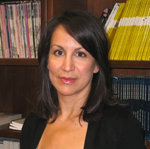Regina Ragan Receives Prominent NSF Faculty Early Career Development Award
Five-year grant bestowed for research in the integration of biological systems with a nano electronic platform
 Regina Ragan, Ph.D., assistant professor of chemical engineering and materials science, has been honored by the National Science Foundation with a prestigious Faculty Early Career Development (CAREER) award and a $590,000 grant, over five years, in recognition of her research in designing robust molecular scale devices.
Regina Ragan, Ph.D., assistant professor of chemical engineering and materials science, has been honored by the National Science Foundation with a prestigious Faculty Early Career Development (CAREER) award and a $590,000 grant, over five years, in recognition of her research in designing robust molecular scale devices.Ragan’s project titled “A Fundamental Study of Biological/Inorganic Interfaces: Understanding Mechanisms for Probing Biomolecular Interactions Using Nanostructures,” will analyze how structure, interfaces and materials affect signal transduction in nanosystems that are designed to measure interactions between molecular systems.
Her research includes understanding the role of surface states on performance of nanowire sensors and optimizing interfacial chemistry between artificial cell membranes and metal electrodes to fabricate membrane arrays. Using scanning probe microscopy, integrated with fluorescence microscopy, Ragan will characterize systems with molecular scale resolution. For example, using the membrane platform, she will examine oocyte membranes fused with diseased brain tissue in order to study the role of protein receptors in brain tumor proliferation.
Nanowire sensor and membrane platforms are fabricated using self-assembly and microelectronic compatible processes, and thus have immense potential for integration with manufacturing processes. High throughput fabrication enables the ability to gather statistics on how these systems behave at the components level of devices, and provides Ragan with crucial understanding to determine how to build robust systems.
“The award for fundamental research of materials integration in bio-nanosystems enables us to take steps toward understanding how to design reproducible devices,” Ragan explains.
Research in this area could lead to performance-enhanced devices used for environmental monitoring and drug discovery, such as identifying new antibiotics to combat increased bacterial resistance.
Ragan’s CAREER proposal also integrates education and research; this includes offering advanced analytical training for students at Don Bosco Tech High School in Los Angeles, with the goal of promoting diversity while increasing and retaining the number of students attending UC Irvine in science, engineering and mathematics.
Ragan received a B.S., summa cum laude, in materials science and engineering at the University of California, Los Angeles in 1996, and a Ph.D. in applied physics at the California Institute of Technology in 2002. She was a postdoctoral scholar in the Information & Quantum Systems Lab at Hewlett Packard, and then joined The Henry Samueli School of Engineering in 2004.
